For the fifth straight year, student enrollment at UNMC reached an all-time high with 3,237 students enrolled for the 2009-10 school year — an increase of 1.3 percent over last year’s previous record total of 3,194.
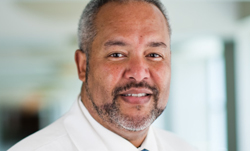 |
Rubens Pamies, M.D. |
Rubens Pamies, M.D., vice chancellor for academic affairs and dean of graduate studies, said the steady increase in enrollment at UNMC is not surprising.
“UNMC is still the best buy for the value,” he said. “Everyone is trying to save money in these tough economic times. The value of the education students receive at UNMC is incredible. The students have access to state-of-the-art facilities with the very latest technology, and they get to learn from outstanding faculty in a great research environment.
“Rankings in publications like U.S. News & World Report just reinforce the quality of the education that students receive here. For students wishing to attend an academic health sciences center, this is the place to go. Judging by how our enrollment continues to climb, it’s obvious that students have figured it out.”
Listed below are enrollment highlights for 2009-10 for each of UNMC’s colleges as well as the School of Allied Health Professions and the Munroe-Meyer Institute:
College of Dentistry
The College of Dentistry brought in 46 first-year dental students as well as 24 new dental hygiene students, said Dean John Reinhardt, D.D.S. The new students bring total enrollment in the college to 269, including 38 graduate and post graduate students.
 |
John Reinhardlt, D.D.S. |
The incoming students include eight who previously participated in the UNMC Summer Medical and Dental Education Program (SMDEP), a Robert Wood Johnson Foundation-supported program to attract students who represent communities or populations that are underserved or disadvantaged toward careers in medicine and dentistry.
Dr. Reinhardt noted that there were 895 applicants for the 46 slots in this year’s dental class, which consists of 26 men and 20 women. The entering dental hygiene class had a 3.54 GPA and includes four students at the Community Action Program of Western Nebraska clinic in Gering, Neb.
College of Medicine
The 131 students in the College of Medicine’s class of first-year students brings total enrollment in the college to 490. The first-year students were selected from a total of 1,402 applications — one of the largest number of applications received by the medical school in the past 15 years, said John Gollan, M.D., Ph.D., dean of the College of Medicine.
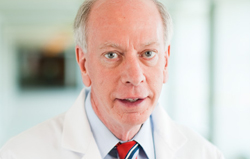 |
John Gollan, M.D., Ph.D. |
College of Nursing
A total of 978 students across all nursing programs and campuses are enrolled this fall. Admission to the college continues to be highly competitive, said Virginia Tilden, D.N.Sc., dean of the UNMC College of Nursing. The college received 667 qualified applicants this year to the baccalaureate in nursing program for 232 slots in the college’s locations in Omaha, Lincoln, Kearney and Scottsbluff — an admission rate of 35 percent.
The incoming students’ GPA is 3.4 based on students’ first two years of college.
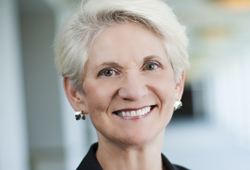 |
Virginia Tilden, D.N.Sc. |
Entry into the college’s graduate programs also is highly competitive, Dr. Tilden said, with the two most popular specialties, family nurse practitioner and acute care nurse practitioner, accepting approximately 50 percent of qualified applicants.
The college is working to reduce the nursing shortage in Nebraska by increasing the number of those who teach nursing and by expanding capacity in facilities to accommodate more nursing students. Two current projects address that goal, including the construction of a Northern Division of the college in Norfolk and an additional building for the college in Omaha, both to be completed next year.
“In addition to support from the Nebraska Legislature, we are fortunate to have strong community and private support to help us provide for the future well-being of Nebraska through exceptionally-educated nurses for tomorrow.” Dr. Tilden said. “We are continuing to work with communities across the state to help us in this cause.”
College of Pharmacy
Sixty-five new students with a mean GPA of 3.66 were accepted into the College of Pharmacy’s Doctor of Pharmacy degree (Pharm.D.) program. These new first-year students bring the total enrollment in the four-year Pharm.D. program to 263 students.
 |
Courtney Fletcher, Pharm. D. |
The breakdown of first-year students includes 68 percent female and 5 percent are minorities. Of the 65 incoming students, 55 percent have already received a prior bachelor or higher degree.
“We are very excited about this year’s incoming students,” said Courtney Fletcher, Pharm.D., dean of the College of Pharmacy. “Collectively they are a very promising group, and it will be fun to see how they progress during the next four years.”
College of Public Health
Enrollment in the Master of Public Health Program (MPH) was 105 for the fall semester, a 19 percent increase over the 2008-2009 academic year. A total of 202 students have enrolled in the MPH program since its beginning in 2002, said Ayman El-Mohandes, M.B.B.Ch., M.D., new dean of the College of Public Health.
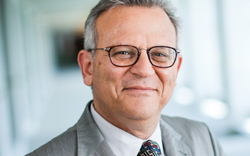 |
Ayman El-Mohandes, M.B.B.Ch., M.D. |
Seventy-four percent were Nebraska residents, 18 percent were from other states while the rest were international applicants.
The newly established College of Public Health also offers three Ph.D. programs in the Departments of Environmental, Agricultural and Occupational Health, Health Promotion and Disease Prevention and Health Services Research, Administration and Policy.
There were 31 applicants for those programs of which 17 were accepted. These programs admitted 11 females, eight minorities, seven international students and nine Nebraska residents.
School of Allied Health Professions
The total enrollment for the School of Allied Health Professions (SAHP) in 2009-2010 is 365 students.
 |
Kyle Meyer, Ph.D. |
For the 2009-10 academic year the SAHP admitted 181 new students in its 11 programs. This represents a 10 percent increase in new students from 2008-09.
The increase was largely derived from expanded class sizes in the physical therapy and physician assistant education programs, said Kyle Meyer, Ph.D., associate dean for the SAHP.
The mean GPA for students entering the SAHP programs in the fall of 2009 was 3.63. Eighty-three percent of new students are Nebraska residents.
SAHP programs continue to be very competitive. There were 679 applicants for 181 available slots, with applications to the dietetic internship program offered through medical nutrition education increasing by 28 percent over 2008-09.
Munroe-Meyer Institute
The UNMC Munroe-Meyer Institute has provided internship and post-doctoral fellowship experiences to students from universities across Nebraska and the nation for more than 25 years, said Mike Leibowitz, Ph.D., MMI director.
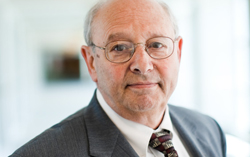 |
Mike Leibowitz, Ph.D. |
Trainees included 39 master’s level students, 55 doctoral level interns, and 59 post-doctoral fellows. More than 40 percent of these students completed 300 hours or more of didactic and interdisciplinary practicum training.
A dozen disciplines were represented by last year’s students, including biological sciences, pediatric dentistry, genetic counseling, general and pediatric medicine, nursing, nutrition, occupational therapy, physical therapy, clinical and school psychology, recreational therapy, social work, and speech-language pathology.
MMI has begun the process of cross-listing courses taught by MMI faculty at the University of Nebraska at Omaha and the University of Nebraska-Lincoln, Dr. Leibowitz said. This year, MMI has initiated a doctoral Applied Behavior Analysis program through UNMC’s Medical Sciences Interdepartmental Area (MSIA) program.